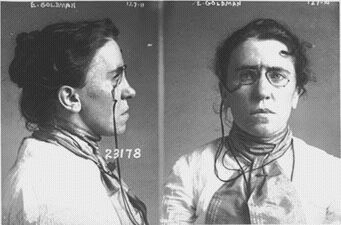Landauer, sometimes called a “religious atheist,” embodies this seeming contradiction. Although he denied the existence of a God “beyond the earth and above the world,” Landauer also defined anarchism as a religion, a kind of spiritual mission, an earthly messianism. What Landauer calls “spirit” is not a supernatural force, but as the shared feelings, ideals, values, language, and beliefs that unify individuals into a community. The State only exists, he says, because the spirit that creates community has weakened: the community has fractured and turned against itself. Thus, Landauer speaks of revolution in spiritual terms, calling it redemption, using Jewish religious language to describe the need for social and political transformation.
 When the Jewish anarchists of Brooklyn defied the call to atonement, calling themselves “the new rabbis of liberty,” they were behaving like the prophets, who themselves were holy teachers of liberty: they were being iconoclasts, rejecting the established religious cult as a hollow ritual, just like the prophets did. It’s Isaiah who thunders that the official ritual of Judaism has become an empty show, a hollow repetition of formal gestures, empty of spirit: "To what purpose is the multitude of your sacrifices unto me? saith the Lord . . . when ye spread forth your hands, I will hide mine eyes from you; yea, when ye make many prayers, I will not hear; [for] your hands are full of blood." Without justice and compassion – the ideals and values that bound the people together in the desert -- ritual is empty. This is what a Jewish anarchist like Yanofsky was reminding his cousins when he wrote angrily in the Arbeter Fraint of the gross spectacle of Yom Kippur services attended by wealthier Jews “overdressed and overfed in seats set aside for the sheine leit” while poor Jews “pressed together by the door, hungry and ill-clad with no prospects of a sumptious fast-breaking meal to return to.” I can hear an echo of Isaiah: "Bring no more vain oblations . . . seek judgment, relieve the oppressed, judge the fatherless, plead for the widow"!
When the Jewish anarchists of Brooklyn defied the call to atonement, calling themselves “the new rabbis of liberty,” they were behaving like the prophets, who themselves were holy teachers of liberty: they were being iconoclasts, rejecting the established religious cult as a hollow ritual, just like the prophets did. It’s Isaiah who thunders that the official ritual of Judaism has become an empty show, a hollow repetition of formal gestures, empty of spirit: "To what purpose is the multitude of your sacrifices unto me? saith the Lord . . . when ye spread forth your hands, I will hide mine eyes from you; yea, when ye make many prayers, I will not hear; [for] your hands are full of blood." Without justice and compassion – the ideals and values that bound the people together in the desert -- ritual is empty. This is what a Jewish anarchist like Yanofsky was reminding his cousins when he wrote angrily in the Arbeter Fraint of the gross spectacle of Yom Kippur services attended by wealthier Jews “overdressed and overfed in seats set aside for the sheine leit” while poor Jews “pressed together by the door, hungry and ill-clad with no prospects of a sumptious fast-breaking meal to return to.” I can hear an echo of Isaiah: "Bring no more vain oblations . . . seek judgment, relieve the oppressed, judge the fatherless, plead for the widow"!
So too in the lives of other Jewish anarchists – David Edelshtadt (1866-1892), sweatshop poet; Abraham Frumkin (1873-1940), itinerant writer and translator; Erich Mühsam (1878-1934) and Carl Einstein (1885-1940), committed artists; Manya Shohat (1880-1961), rebel without borders; Senna Hoy (1882-1914) and Paul Goodman (1911-1972), anti-war activists and defenders of homosexual rights; Etta Federn, founder of the revolutionary womens’ organization, Mujeres Libres (1883-1951); Rose Pesotta (1896-1965), tireless labor organizer -- these men and women spent their lives fighting for civil liberties, womens’ rights, and for the rights of working people, gay liberation, ecology, peace and freedom; they endured terror, jail, separation from their loved ones, exile, and hardships beyond measure. They took care of people – as organizers, nurses, teachers, lovers, fighters, peacemakers, friends – and never submitted to the will of arbitrarily established authorities. For these activists, the coming of the Messiah was not something to pray for but to embody; the day of redemption was not something to await but to live. In heresy, in protest, they kept faith with Israel.

The Jewish Council on Urban Affairs: An appreciation
March, 2005
February, 2005
Secularism, Kabbalah, and Radical Poetics
December, 2004
A debate between the author of "A Jewish Critique of Bushism" and the head of "L.A. for Bush"
October, 2004
Robert Meeropol's An Execution in the Family
January, 2004
Hypercapitalism as Satanism
June, 2003
The weird and worrying links between the radical Left and the Islamist Right
April, 2003
Will the star of 8 Mile be America's next working class hero?
December, 2002
For the Left's voice to be heard, it needs to play by the rules
November, 2002
Am I an environmentalist for the same reasons I don't like to spend money?
April, 2002
The rich are ripping us off! What are you gonna do about it?
April, 2002



Neurotic Visionaries & Paranoid Jews
April 7, 2005
Jews on Stage
Dan Friedman
Out of Bounds
Angela Himsel
Masoretic Orgasm
Hayyim Obadyah
Messianic Troublemakers: Jewish Anarchism
Jesse Cohn
The Hasidim
Hila Ratzabi
Discipline
Jay Michaelson
Archive
Our 640 Back Pages
Zeek in Print
Spring 2005 issue now on sale!
About Zeek
Mailing List
Contact Us
Subscribe
Tech Support
Links
From previous issues:
I'll Say Goodbye and Let You Go
Abigail Pickus
Dead Sea
Debra Bruno
Shakey: An Essay on Anger
Jay Michaelson
 Email us your comments
Email us your comments